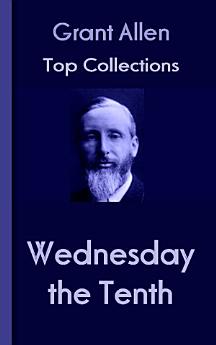Wednesday the Tenth: Grant Allen's Top Collection
About this ebook
On the eighteenth day out from Sydney, we were cruising under the lee of Erromanga—of course you know Erromanga, an isolated island between the New Hebrides and the Loyalty group—when suddenly our dusky Polynesian boy, Nassaline, who was at the masthead on the lookout, gave a surprised cry of "Boat ahoy!" and pointed with his skinny black finger to a dark dot away southward on the horizon, in the direction of Fiji.
I strained my eyes and saw—well, a barrel or something. For myself, I should never have [pg 10] made out it was a boat at all, being somewhat slow of vision at great distances; but, bless your heart! these Kanaka lads have eyes like hawks for pouncing down upon a canoe or a sail no bigger than a speck afar off; so when Nassaline called out confidently, "Boat ahoy!" in his broken English, I took out my binocular, and focused it full on the spot towards which the skinny black finger pointed. Probably, thought I to myself, a party of natives, painted red, on the war-trail against their enemies in some neighboring island; or perhaps a "labor vessel," doing a veiled slave-trade in "indentured apprentices" for New Caledonia or the Queensland planters.
To my great surprise, however, I found out, when I got my glasses fixed full upon it, it was neither of these, but an open English row-boat, apparently, making signs of distress, and alone in the midst of the wide Pacific.
About the author
Charles Grant Blairfindie Allen (February 24, 1848 – October 25, 1899) was a Canadian science writer and novelist, and a proponent of the theory of evolution.
Allen was born near Kingston, Canada West (now incorporated into Ontario), the second son of Catharine Ann Grant and the Rev. Joseph Antisell Allen, a Protestant minister from Dublin, Ireland. His mother was a daughter of the fifth Baron of Longueuil. He was educated at home until, at age 13, he and his parents moved to the United States, then France and finally the United Kingdom. He was educated at King Edward's School in Birmingham and Merton College in Oxford, both in the United Kingdom. After graduation, Allen studied in France, taught at Brighton College in 1870–71 and in his mid-twenties became a professor at Queen's College, a black college in Jamaica.
Despite his religious father, Allen became an agnostic and a socialist. After leaving his professorship, in 1876 he returned to England, where he turned his talents to writing, gaining a reputation for his essays on science and for literary works. One of his early articles, 'Note-Deafness' (a description of what is now called amusia, published in 1878 in the learned journal Mind) is cited with approval in a recent book by Oliver Sacks.
His first books were on scientific subjects, and include Physiological Æsthetics (1877) and Flowers and Their Pedigrees (1886). He was first influenced by associationist psychology as it was expounded by Alexander Bain and Herbert Spencer, the latter often considered the most important individual in the transition from associationist psychology to Darwinian functionalism. In Allen's many articles on flowers and perception in insects, Darwinian arguments replaced the old Spencerian terms. On a personal level, a long friendship that started when Allen met Spencer on his return from Jamaica, also grew uneasy over the years. Allen wrote a critical and revealing biographical article on Spencer that was published after Spencer was dead.
After assisting Sir W. W. Hunter in his Gazeteer of India in the early 1880s, Allen turned his attention to fiction, and between 1884 and 1899 produced about 30 novels. In 1895, his scandalous book titled The Woman Who Did, promulgating certain startling views on marriage and kindred questions, became a bestseller. The book told the story of an independent woman who has a child out of wedlock.
In his career, Allen wrote two novels under female pseudonyms. One of these was the short novel The Type-writer Girl, which he wrote under the name Olive Pratt Rayner.











